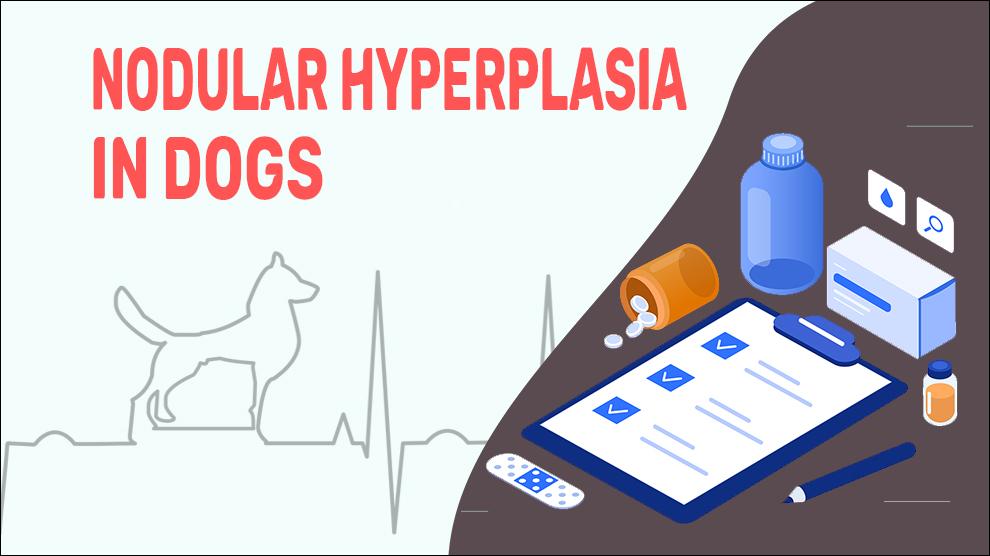Focal nodular hyperplasia (FNH) is a non-neoplastic hepatic mass lesion and this is also the second most prevalent benign canine liver lesion. FNH accounts for around eight percent of all non-hemangiomatous liver lesions and it is surpassed in prevalence only by liver hemangioma.
Focal nodular hyperplasia is defined as a localized, proliferative, hyperplastic overgrowth of the epithelial parenchymatous cell of the liver near a vascular anomaly, particularly an arterial irregularity. That means, it is the liver’s regenerative response to a localized vascular injury/ anomaly.
FNH is a solitary, grayish-white or pale yellow-brown, subcapsular, unencapsulated, well-circumscribed, firm, plainly nodular lesion with a depressed stellate scar at the center of the lesion ( but not always). Radiating from the scar, fibrous strands divide the lesion into nodules. MRI of the liver or Contrast-enhanced CT scan shows FNH as a hypervascular lesion with a non-enhancing central scar that that enhances during the arterial phase.
First described by Pathologist Dr.Hugh Edmondson in 1958, FNH is considered to be the result of an increase in hepatocyte number due to hyperperfusion or hypoperfusion within the liver lobule due to anomalous arteries.
Symptoms Of Nodular Hyperplasia
Most dogs with FNH don't have any specialized symptoms. General symptoms are
- Abdominal pain/Abdominal swelling
- Disorientation
- Diarrhea
- Increased need to urinate
- Lethargy
- Increased thirst
- Jaundice
Treatment Options For Nodular Hyperplasia
Treatment is not necessary for most FNHs. However, rarely do the lesions get large and cause discomfort or other symptoms, then they will be surgically removed.
- Immediate hospitalization and close monitoring are required for acute liver failure, if not treated immediately, will cause death.
- Intravenous fluid and nutritional therapy will be given to help your dog not become severely dehydrated.
- Immunosuppressive or anti-inflammatory medications.
- Anti-diarrhea medications.
- Partial hepatectomy surgery or laparoscopic resection –when the lesion is large.
Home Remedies For Nodular Hyperplasia
Work with your vet to find the optimal dietary plan for your dog.
Make sure to provide plenty of drinking water.
Home remedies such as herbs, diet and exercise will depend on your dog’s age and stage of disease they are in.
Prevention Of Nodular Hyperplasia
Nodular hyperplasia etiology is poorly understood. Specific causes are not yet known. However, Hereditary is, perhaps a factor in some breeds and it is better to evaluate the affected dogs before breeding or at least before getting a dog from a susceptible lineage, get the health checks done.
Affected Breeds Of Nodular Hyperplasia
Senior Dogs, Bedlington Terrier, Cocker Spaniel, Chihuahua, Doberman Pinscher, Labrador Retriever, Maltese, Skye Terrier, Standard Poodle, Springer Spaniel, West Highland White Terrier
Additional Facts For Nodular Hyperplasia
Types:
Two types of central scar in FNH:
Typical: 80%
The tumor is characterized by the presence of a pale yellow-brown or grayish-white scar, depressed, well-defined, centrally located scar with fibrous strands radiating outwards toward the margins of the tumor. Approximately 50% of all FNH nodules have this stellate scar, but its occurrence is considered pathognomonic.
Atypical: 20%
When the central scar is absent or if it is present but doesn’t have the classic features of a typical scar, it is called an atypical central scar in FNH.
Morbidity:
- One of the common causes of morbidity and mortality in dogs is liver problems.
- Acute liver failure happens if over 70% of the hepatocellular mass is diminished so that there is inadequate hepatic parenchyma to continue excretory and synthetic homeostasis. This is rare in focal nodular hyperplasia.
- FNH affects more women than men at a ratio of approximately 8 :1.
Mortality:
FNH is a benign condition and usually does not progress to malignancy as the tumors often don't change much over time.
The lesions do not need surgical resection unless they get bigger and symptoms persist. However, presently available diagnostic modalities for FNH does not properly confirm the diagnosis and are often found inadvertently in radiological investigation.
Diagnosis:
- CT scan and MRI
- Histopathological examination using hematoxylin-eosin staining
- Immunohistochemical examination
- Liver biopsy
Differential diagnosis:
- Hemangioma
- Hepatocellular carcinoma
- Hepatic adenoma
- Idiopathic noncirrhotic portal hypertension
- Fibrolamellar hepatocellular carcinoma
- Metastatic disease
- Regenerative nodules
Prognosis:
The prognosis for Nodular hyperplasia is really good. As the existing condition is not life-threatening, no rigorous treatment is usually necessary. However, relapse is possible following medical treatment in affected dogs. Proper hygiene and home care are the best defenses against future recurrences.
When To See A Vet
It’s better to set up an appointment with your veterinarian if you notice-
- Recurrent Abdominal pain
- Jaundice
Food Suggestions For Nodular Hyperplasia
Diet for overactive liver enzymes includes:
- Provide a balanced diet: Select foods from all food groups: vegetables, meats, grains, fruits, milk, and oil
- Add lots of veggies (green leafy vegetables, broccoli, carrots, especially)
- Protein- Lean chicken or turkey breast, lean beef, Cooked fish (salmon, tuna)
- Antioxidants– Blueberries, Cauliflower, Beets, Beans, etc
- High fiber diet- boiled green peas, carrot, oatmeal, brown rice(cooked), lentils(boiled), black beans (boiled)
Conclusion
As most nodular hyperplasia for affected dogs is incidental and benign, they do not require treatment or monitoring over time. The Prognosis is also excellent. Some lesions are large and hamper liver function or block the bile flow, they are warranted for long-term monitoring every 3-6 months.

















